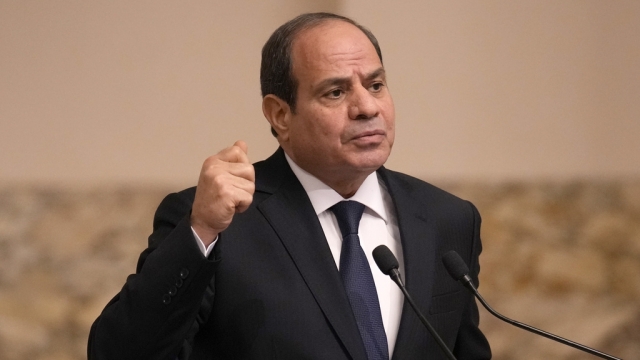Egypt has emerged as a prominent player in the negotiations for peace amid the conflict between Israel and Hamas.
On October 18th, returning from his visit to Israel, U.S. President Joe Biden had this to say of Egyptian President Abdel Fattah El-Sisi: “So the bottom line is that El-Sisi deserves some real credit because he was very accommodating and quite frankly as everyone I have spoken to thus far since this trip began.”
A few days later, Cairo hosted a summit on the war for regional leaders and some Western officials, which did not include representatives from Israel or Hamas. According to state-run media, the summit was arranged in order to discuss strategies for de-escalation.
“Egypt condemns with complete clarity the targeting, killing, or intimidation of all peaceful civilians,” said El-Sisi.
Egypt has been essential in controlling the transport of aid to Palestine through the Rafah [Rah-Fah] border crossing, the only border with the Gaza Strip not controlled by Israel.
That summit didn't produce much in the way of tangible outcomes or joint statements. But
Egypt's mediating role could still go far beyond its shared border with Gaza.
First, the country has a complicated history with Israel, a key economic partner and strategic ally in fighting insurgents in the Sinai Peninsula.
“Yeah, it's a really interesting relationship between Egypt and Israel because while technically they are at peace, having signed, you know, the Camp David Accords back in the late seventies, it's never really been a warm peace,” said Vivian Yee, Cairo Bureau Chief, The New York Times.
“For the last 30 years, through four wars, the people of this troubled region have paid a terrible price in suffering, division and hatred, and bloodshed. No two nations have suffered more than Egypt and Israel,” said former President Jimmy Carter.
“The Egyptian public sees Israel with a lot of hostility, which is only more true now that this is happening,” said Yee. “You know, they don't want to be seen as too cozy, but they also have worked together very closely behind the scenes.”
SEE MORE: Israel at War: Scripps News reports from on the ground
At the same time, Egypt has worked with Hamas in the past to negotiate ceasefire agreements and prisoner swaps. But it's an often-fraught working relationship.
Hamas was originally an offshoot from the Palestinian branch of the Muslim Brotherhood, an Islamist political organization that was based in Egypt.
The Muslim Brotherhood would take power in Egypt after the 2011 Arab Spring Revolution.
Incidentally, the president at the time would be instrumental in brokering peace between Hamas and Israel after flare-ups of violence.
The party was in power for one year before its leaders were ousted in a military coup.
“That was a very tumultuous time for Egypt, where basically the military came back and deposed the Muslim Brotherhood president and has since then labeled the Muslim Brotherhood as a terrorist group,” said Yee.
But in the years that followed, Hamas would occasionally be a reluctant ally for Egypt as they shared a common enemy: a branch of ISISthat ramped up attacks in the Sinai Peninsula.
And Hamas would even send its troops to the border to help fight back against ISIS insurgents.
In 2017, it formally renounced its association with the Muslim Brotherhood. Delegations from Egypt would be received by Hamas leadership, as seen here, and vice versa.
By the end of the 2010s, Egypt had working relationships with both Hamas and Israel, making the country a prominent player in negotiating between them.
But despite this role, Egyptian sentiment toward the conflict has been far from 'neutral.'
“The Egyptian public has a long memory dating back to the Palestinian struggles of the forties, fifties, and sixties. And then, of course, Egypt itself was at war with Israel multiple times,” said Yee. “And right now, it's really at a fever pitch with Egyptians of all backgrounds, really, but especially young Egyptians being really fired up about this and saying, Hey, this is this, you know, bombing campaign in Gaza is just so in your face. How can we ignore this any longer?”
SEE MORE: Israel-Hamas conflict creating culture wars among Americans
The Egyptian President has harshly condemned Israeli bombing of Gaza and, in a press conference, accused the Israeli government of "collective punishment" of Palestinians, which is forbidden under international law.
Part of the reason Egypt vehemently opposes accepting Palestinian refugees from Gaza is because of concerns that this could result in permanent resettlement in Egypt, which would dilute the push for Palestinian statehood.
Neighboring Arab nations like Egypt and Jordan officially support a two-state solution, typically one based on borders prior to the 1967 Six-Day War.
Egypt has also opposed taking in refugees out of security concerns with Hamas and economic reasons; the country is facing mounting economic crises and is already trying to manage hundreds of thousands of refugees from Sudan.
Large protests supporting Palestinians have taken place in the nation's capital.
According to the New York Times and reporting from Al Jazeera, some of these protests may have been organized and run by the Egyptian government itself.
“The scale of the conflict means that Arab leaders like President Sisi have to confront this head-on and confront the fact that their publics, their people are extremely passionately pro-Palestinine and that they can't just let this issue kind of languish for years again like they have for the past couple of decades,” said Yee.
Throughout the past few decades, Egypt's sentiment toward Hamas, Israel, and the conflict has been complex and ever-changing.
But more than ever, it will remain a key player in any attempts to broker peace or stability in the region.
Trending stories at Scrippsnews.com




